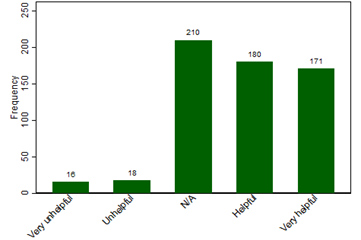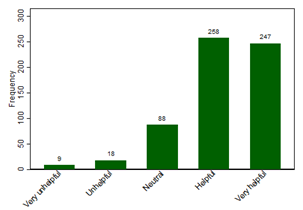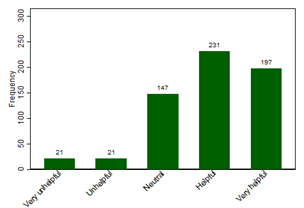At a Glance
Institution:
York University
Instructor:
Robert McKeown
Course Name:
Introductory Mathematics for Economics
Course Material in Use:


ALEKS Prep for Calculus with Limits
Resource in Use:
ALEKS Prep
Course Type:
Online / Blended or Flipped Classroom
Integration:
Sakai
Course Enrollment:
1,000

Before using ALEKS, Professor Robert McKeown found that first-year students in his Introductory Mathematics for Economics course suffered from low retention rates due to poor performance in mathematics. Students entering the course struggled with calculus because they were not sufficiently skilled in algebra and other pre-calculus topics. Prior to implementing ALEKS, students did not have sufficient practice problems to review pre-calculus, the practice problem options they did have were often complicated, and the solution explanations lacked detail.
“What my course really needed to complement the interactive classroom was a powerful homework tool.”
Professor McKeown first implemented ALEKS in 2020 and immediately enjoyed how easy it was to use. He found creating tests and quizzes on the platform straightforward. Any technical hurdles were supported by Professor McKeown’s McGraw Hill representative, including integrating the ALEKS gradebook into the courses’ LMS and accessing student’s performance data easily. Scott was always readily available to assist Professor McKeown with any questions or struggles he had, including weekends and evenings. Even students stated that they found the technical support offered by McGraw Hill helpful:


Professor McKeown’s students currently use ALEKS as a homework tool outside of class including completing graded quizzes and a term test. Activities completed via ALEKS are worth a total of 30% of student’s final grade.
Compared to other platforms that Professor McKeown had used in the past, he found that ALEKS’s GUI was quicker, simpler, and more potent, with an impressive equation writer. He liked the open-ended nature of questions as this allowed him to assign questions with both numbers and placeholders.
The most impressive feature of ALEKS for Professor McKeown was its assessment algorithm and unique learning paths. ALEKS eliminated the need for assigning practice problems to the entire class, as it formulated an optimal, individualized learning trajectory for each student. This personalized learning saves students valuable time and prevents unnecessary frustration by finding the perfect balance of harder and easier questions to suit an individual’s knowledge base.
“The knowledge checks and unique learning path are my favourite features. They help formulate an optimal, individualized learning plan for each student. This creates a personalized learning experience while saving students valuable time and preventing unnecessary frustration.”
Before adopting ALEKS, Professor McKeown found it difficult, even impossible, to teach at a pace and level of difficulty that satisfied all of his students. Now ALEKS has given him confidence that his students have a tool to teach them every precalculus topic that they might need for university. Consequently, he focuses on the topics that will engage students and build a sense of curiosity about mathematics in economics.
Since ALEKS has been in place in his course, Professor McKeown has found that students who scored well on their latest ALEKS knowledge check and term test on ALEKS also scored well in the calculus component of the course. He found that a 1 percent increase in the standard deviation of the ALEKS term test was correlated with a 0.33 standard deviation increase on their combined calculus test and exam score.
"ALEKS Math improves the math vocabulary of my students, which leads to more fruitful conversations. They are using terms like vertex and secant that they never used before!“This is so much more fun in class than a boring lecture.”
Students have also expressed their satisfaction with ALEKS. Students were asked questions about the helpfulness of ALEKS with the following results:
“ALEKS helped me with my overall learning for this course.”


“Using the ALEKS software has increased my likelihood of staying in a math-based.”


The above tables show that many students felt that ALEKS helped their overall learning and increased their likelihood of staying in a math-based program.
"The adaptive learning software of ALEKS creates an amazing personalized experience. ALEKS Math helps raise your students' belief in themselves, making them ready to learn harder subjects.”
What do students think?
Professor McKeown asked his students, “How did ALEKS encourage or not encourage your overall learning? Was it boring? Frustrating? How were the learning modules helpful, or not helpful? Are there any other materials you would have found to be more useful?” Here’s what students had to say:
Instructor Profile
Robert McKeown is an Assistant Professor, teaching in the Department of Economics at York University. He brings a unique combination of academic and practical experience to his role, thanks to his dual qualifications as a Chartered Financial Analyst® and holder of a PhD in Economics. His teaching philosophy is centered around active learning in the classroom and leveraging technology to deliver an authentic learning experience, even in large classrooms. Technology has the power to enhance student success through frequent quizzes, interactive videos, and AI powered learning software. He advocates for creativity in building student engagement and innovative ways to deliver subject matter.


Recommendations from Professor McKeown
Professor McKeown shares some tips and recommendations to fellow instructors interested in adopting ALEKS for their course:
- You can easily create a unique course by selecting from the many useful topics on ALEKS.
- Incentivize your students with grades as much as possible to encourage students to use the software and minimize frustration.
- Align ALEKS with your curriculum, so students easily recognize that working on ALEKS will improve their course grade.
- Be creative! There are many ways to integrate ALEKS into your course. Many students make references that ALEKS is like a game.
- Stay Updated: EdTech is a rapidly evolving field, and ALEKS frequently updates its platform with new features and resources.
